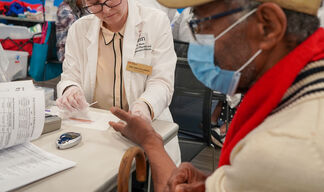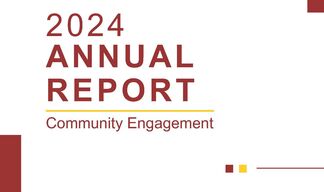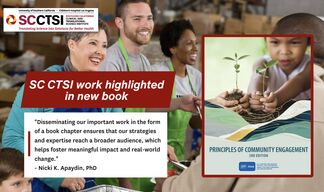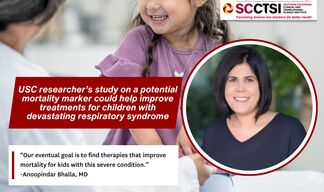Inequities in a Pandemic: Unique Survey Aims to Discover Healthcare Disparities and Vaccine Attitudes Among Populations Most Affected by the COVID-19 Pandemic

The COVID-19 pandemic has permanently altered the lives of countless people. Not only that, but it has affected people unequally -- we have seen people of color dying at higher rates than white counterparts, according to the Centers for Disease Control and Prevention. A recent survey by USC researchers supports the observation that the pandemic is affecting certain racial and ethnic groups more than others.
SC CTSI KL2 Program alumni Sonali Saluja, MD, MPH, FACP and co-principal investigator Cameron Kaplan, PhD, are working hard to pinpoint why these disparities exist. In December 2020, they surveyed almost 2000 residents of Los Angeles County to examine COVID-19 testing disparities as well as attitudes toward the vaccine across different demographics. Their project was funded by the W.M. Keck Foundation and the Gehr Family Center for Health Systems Science and Innovation.
Unlike other studies, this survey was unique in that it sought information that would not be easily found in electronic health records or databases. Rather than looking for numbers to represent how people felt about the pandemic, Saluja and Kaplan posed questions to respondents that aimed to uncover any mistrust or hesitancy related to the COVID-19 vaccine.
After analyzing the data, they found that around 28 percent of people in LA County felt hesitant about taking the vaccine. More specifically, Hispanic, Black, and lower income respondents made up the majority of those feeling hesitancy.
“The most common reason that racial and ethnic minorities cited as reasons for hesitancy were that they were concerned about side effects and that they wanted to wait and see how the vaccine worked,” Saluja said.
Data from the survey also showed that people were concerned about the speed at which the vaccine was developed. Identifying reasons for hesitancy like these are crucial when it comes to effectively conveying confidence in the vaccine.
“Addressing some of the concerns about side effects and easing people’s fears about the development process are important steps that can likely be achieved by having trusted community members share their experience, and by building trust in the roll-out process by ensuring equitable access to the vaccine,” Kaplan added.
Looking to the future, this survey was only the starting point for targeting healthcare disparities in the pandemic. Sharing the insight gained in this survey will be key to ensure Saluja and Kaplan’s research continues to make an impact across the scientific community.
The COVID-19 pandemic has brought to light many of the racial and ethnic related disparities that exist in healthcare. Research and surveys like this one will inform vaccine distribution methods across the nation and help public health experts ensure that no populations are being left behind as the nation seeks to overcome this deadly pandemic.
“With help from CTSI and the Gehr Family Center for Health Systems Science, we will be sharing our findings in scientific journals and with researchers, policymakers and the community through webinars, discussions and a policy brief.”



